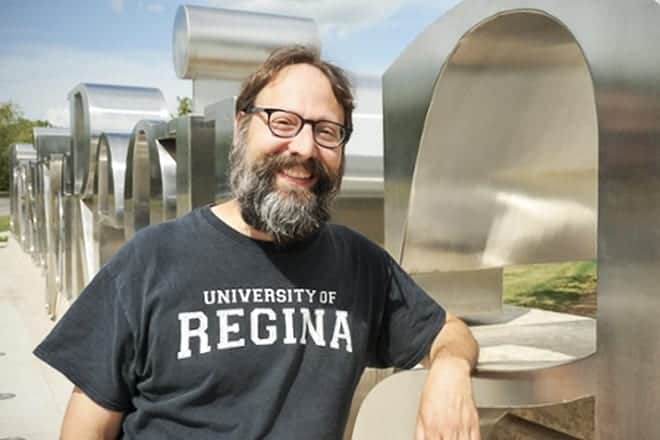People and places

Full-time professor and Dead Head, Marc Spooner
University of Regina educator and former federal NDP political candidate Dr. Marc Spooner recently caught up with the Carillon to talk about his passion for the Grateful Dead, www.RateMyProfessors.com, and his political ambitions moving forward.
I’ll get right to the most important question. How long have you been a Dead Head?
(Laughs) Since undergrad in my early twenties… way back at Carleton University.
For you, is it the music or the culture of the band — what it stands for? Or is it a mix of the two?
All of it. There’s definitely the unique culture; it’s kind of like running away with the circus when you go. There’s a real sense of community and kind of a oneness and harmony… And there are also these moments when the music is kind of improvisational, where it really comes together and there’s a kind of communion between the band and the audience, and everyone seems to be in sync. It doesn’t happen all the time. But when it does, it’s kind of magical. There’s that aspect, and there’s the other whole aspect of the Grateful Dead that we don’t realize. They were basically the precursor to the open movement, in terms of open publishing [because] they encouraged their fans to come and record their music. I heard Mickey Hart talk before about how they’re probably the most recorded band in history, because thousands of people would come and record their shows. Every musical note that they played has been recorded and openly traded. They allowed that; in fact, they encouraged it.
How many times have you seen them perform?
I haven’t seen them as many as most Dead Heads; I’ve always had a job (laughs). I think I’m around eleven or twelve. Many of my friends have seen them 81 times. I always had to come back to a job, so I wasn’t able to completely go on tour with them.
Did you make it down to Chicago for the series of shows last year?
I did… It was fantastic and magical (laughs).
A lot of people were sceptical they’d capture that magic of old. But they did, in your opinion?
Yeah, I think they did. The guitarist from Phish, Trey Anastasio, I think he did a good job and was a good choice to include, to maybe fill in for (Jerry Garcia). I was kind of sceptical and a bit afraid as well, but I knew I had to give it a try. It all came together.
To totally switch gears, your easiness rating on www.RateMyProfessors.com is 2.3 out of 5. Is that a coincidence? How important is it for you to challenge your students?
My big knock about (that website) is there’s no guarantee those people were actually in your class. When I was looking through a lot of them, I knew some of my friends had filled it out with sort of funny things – people from back home who have never taken my courses at all (laughs). I’d say a good teacher helps people jump that gap between what they know and what they don’t know… It’s about pushing students – it maybe sounds a little trite – but to reach their full potential. I wouldn’t go by that site very much; I would go by talking to students who have actually taken my class. I think there you’d get a more accurate picture of my teaching style.
What’s been the best compliment you’ve received from a former student?
I get emails, sometimes three, four years later saying they really understand more of what I was talking about and that they’ve changed the direction of their life. Those are always very nice to get. I’ve had other students who have developed, for instance, a whole approach to teaching about residential schools. This particular student has been acknowledged in the TRC report, and she’s come up with Project of Heart, which I know Luther is doing seven weeks of (in January and February). That was one thing that came out of one of my classes that I’m really proud of. I learn so much from them as well.
What is the most rewarding aspect of your career as a professor at the University of Regina?
When people realize the inequity that surrounds us that they were maybe oblivious to. Privilege… makes us kind of numb. When we’re swimming in privilege, we tend to not notice the hardships that are all around us. When students see that, realize it, and then want to do something about that, that makes me hopeful for the future.
Do you have further political ambitions?
It kind of comes and goes. I get really frustrated with the leadership that I see around us, for instance at city hall. I think they don’t do nearly enough about homelessness and about racism in our city. And then I look provincially, where I fear we’re going further and further down the wrong path – increasing debt, we’ve done nothing to diversify our economy, and we’re attempting these public-private partnerships that have been shown to cost more money in the end. We’re offloading debt to our children, which scares me, and I think is completely wrong. I think we should leave the province and the world better, not worse, for our children. I heard a saying recently that I really like: The world isn’t inherited from your ancestors; it’s borrowed from your children. And I think that’s something we should keep that in mind.










